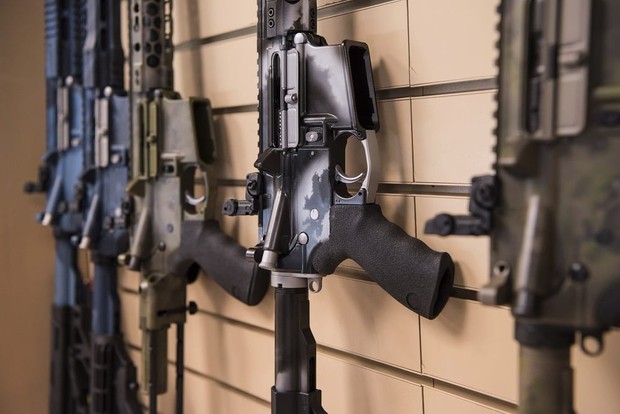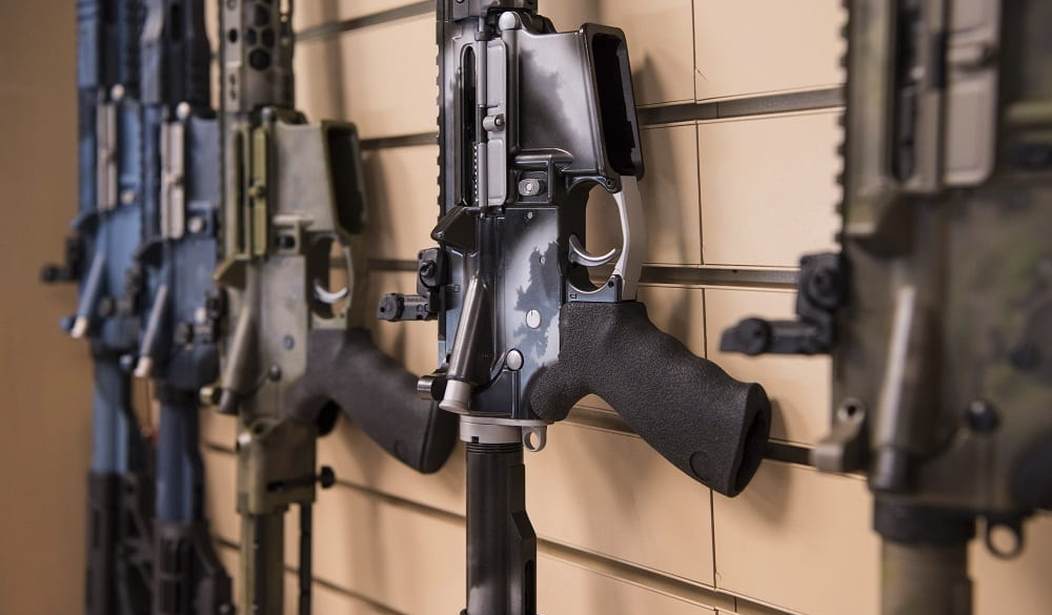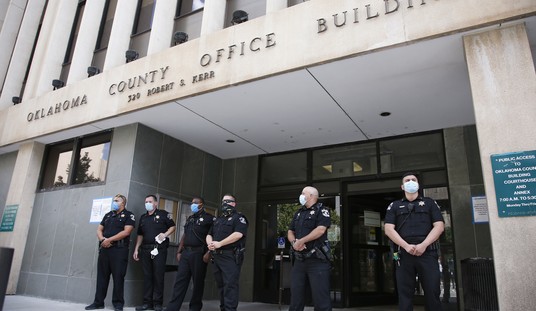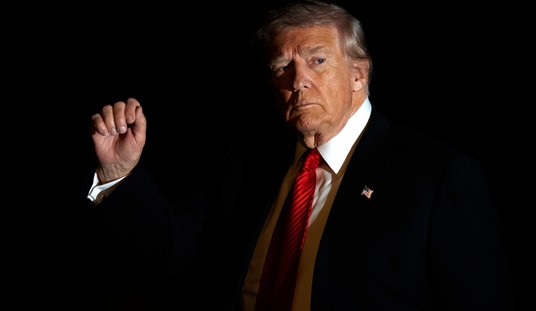
In this photo taken March 15, 2017, AR-15 style rifles made by Battle Rifle Co., a gunmaker in Webster, Texas, are on display in its retail shop. The gunmaker is one of more than 10,000 currently in the United States. President Donald Trump promised to revive manufacturing in the U.S., but one sector is poised to shrink under his watch: the gun industry. Fears of limits on guns led to a surge in demand during President Barack Obama’s tenure and manufacturers leapt to keep up. (AP Photo/Lisa Marie Pane)
After every mass shooting, there is a general outcry to “do something.” Doing something for the sake of doing something is a human impulse that often yields evil and stupid results which is why that impulse usually has wide bipartisan support. Such a movement is underway in the Congress and the only thing saving us is institutional lethargy. The “do something” action is the so-called “red flag law” being flogged by South Carolina Republican Lindsey Graham and noted Vietnam war hero Richard Blumenthal.
Red flag laws basically give third parties–family members, police, health care professionals, educators, internet randos–standing to ask a judge to issue an order hailing you into a court proceeding where you have to convince a judge that you aren’t a danger. This is how the New York Times describes it:
They are state laws that authorize courts to issue a special type of protection order, allowing the police to temporarily confiscate firearms from people who are deemed by a judge to be a danger to themselves or to others.
Often, the request for the order will come from relatives or friends concerned about a loved one who owns one or more guns and has expressed suicidal thoughts or discussed shooting people. The authorities may also request an order.
How long the guns are taken away under these “extreme risk protection orders” depends on the circumstances, and can usually be extended only after another court hearing. The orders also bar the person they cover from purchasing guns.
The idea here is that, in the instance of the Parkland shooter, if the police who had visited the shooter’s home at least 39 times due to complaints of dangerous behavior by his step-parents and the educators who didn’t want him expelled from school because it would screw up their statistics had only had this tool, then the shooter could have been prevented from carrying out the shooting. I stopped believing in leprechauns a long time ago.
With any kind of prophylactic behavior, it is really hard to tell what the impact is because you really can’t prove negatives. How many lives were saved by seatbelts? How about seatbelts in airlines? How many lives were saved by putting warning labels on step ladders? There seems to be some evidence that the laws may keep a very, very tiny number of people from committing suicide but suicide rates in states with and without red flag laws haven’t changed downward. One estimate, based on a study of the laws in Indiana and Connecticut, is that one life is saved for every 10-20 gun confiscations. Looked at in another way, for every life saved as many as 19 Americans were unjustly deprived of a constitutional right. As an aside, as assisted suicide is all the thing in many of the states with red flag laws, these seem to be working against the public policy objective of encouraging suicide. I suppose its because no federal money is attached to a successful gun suicide while the other might potentially qualify for Medicare or Medicaid funds.
What is sort of a surprise (actually not, but I have to pretend it is) is that the same people who claim that we should not trust the federal government to prevent Big Tech firms from controlling free speech are as happy as a pig in sh** with the thought of allowing the federal government and assorted unelected bureaucrats to confiscate firearms based on a whim. This is National Review’s very own Pierre Laval, Donald Trump Is Right to Call for Red-Flag Laws:
Properly drafted, these laws can save lives while also protecting individual liberty. Improperly drafted, they grant the state an overly broad tool that can be systematically abused to deprive disfavored citizens of a fundamental constitutional right.
So, what are the elements of a properly drafted red-flag law? I outlined my suggestions after the Parkland school shooting, and I’ll repeat them here:
- It should limit those who have standing to seek the order to a narrowly defined class of people who have direct interaction with the respondent (close relatives, members of their household, employers, educators).
- It should require petitioners to come forward with clear, convincing, admissible evidence that the respondent is a significant danger to himself or others.
- It should grant the respondent an opportunity to contest the claims against him.
- In the event of an emergency, ex parte order — one granted before the respondent can contest the claims — a full hearing should be scheduled quickly, preferably within 72 hours.
- The order should lapse after a defined period of time unless petitioners can come forward with clear and convincing evidence that it should remain in place.
The Cato Institute’s David Kopel made a compelling argument in Senate testimony earlier this year that my first suggested element is wrong. He argued that seizure orders should be sought only by law-enforcement officers, either at their own behest or at the request of a gun owner’s family members. His case was a good one, but we need not resolve the question of standing here, in part because he made an even better suggestion for a coherent drafting process.
This is one of those things where if you add enough weasel words you can rationalize almost anything. Drafting means nothing. As former RedStater Gerry Dales notes on a different subject, you have to see what could happen, not what is intended to happen:
Laws should never be judged on their intent. They should mostly be weighed on how they can be abused, followed by the likelihood they will be ineffective, and then lastly maybe on the potential benefit. But never ever just on their (stated) intent.
— Gerry (@GerryDales) August 7, 2019
Practically, no red flag law would have prevented either the El Paso or Dayton shooting. Both shooters may have seemed a little strange but if that is the standard then we might as well issue a red flag order with each birth certificate. The “kill-rape” list the Dayton shooter developed was at least six years old, likewise his interactions with teammates on his high school track team. The red flag order would only have affected him had it been extended into a virtual perpetual order by a judge.
What does this look like in real life:
In Florida and Maryland, both of which enacted red flag laws soon after the Parkland shooting, initial orders, which are issued before the “respondent” has a chance to respond, are almost never denied. They last up to two weeks in Florida and up to a week in Maryland, where they can be extended for up to six months.
At the next stage, when the respondent finally gets a hearing, renewable orders lasting up to a year are issued 62 percent of the time in Maryland and 95 percent of the time in Florida. The difference in approval rates may have something to do with the fact that Florida allows petitions only by law enforcement agencies, while Maryland opens the door to relatives, intimates, cohabitants, physicians, and mental health specialists.
Florida nevertheless allows judges to consider any evidence they deem relevant, and its “significant danger” test is inherently vague, notwithstanding its “clear and convincing” standard of proof. Some states are even looser, requiring only “a preponderance of the evidence,” meaning any likelihood greater than 50 percent that the respondent poses a “significant” risk.
The upshot is that people can be stripped of the constitutional right to armed self-defense even when they almost certainly would not have used a gun to harm themselves or anyone else. “All the pressure is on the other side,” says Orlando attorney Kendra Parris. “There’s absolutely no downside to just going ahead and issuing the order.”
[Orlando attorney Kendra] Parris has represented a college student who did not own any guns, had no history of violence, and had never threatened anyone but who nevertheless was an early target of Florida’s red flag law because he said some stupid things about mass shootings on Reddit. Another client was slapped with a gun confiscation order because he criticized teenaged gun control activists online and posted a photo of an AR-15 rifle he had built.
As our Bearing Arms colleague, Cam Edwards points out in a response to a proposal by Representative Dan Crenshaw for a red flag law:
The other concern is that these laws deal with an inanimate object owned by someone deemed to be a threat to themselves or others, but doesn’t deal with the individual at all. These are gun control bills, not mental health bills. Someone subjected to a red flag order is told they’re too dangerous to own guns, and then they’re left alone. With their car keys. With matches and gasoline. With sharp knives. With whatever pills they may have in their medicine cabinet. What they’re not left with is any sort of resource to deal with what’s making them a threat to themselves or others.
Most states already have laws on the books that allow for law enforcement to take someone into custody for an involuntary mental hold of up to 72 hours, if necessary, in order for doctors to make an evaluation. But mental health facilities are overcrowded, and red flag hearings can be done in just a few hours, not a few days. It’s more efficient, even if it’s much less effective, to pursue an ERPO.
Red flag laws are a gun control solution to a mental health problem. They take the guns and leave the mental health issues unaddressed. Even if the due process concerns are addressed, the focus on guns and not the person makes any bill I’ve seen so far not worth supporting. Ultimately they don’t touch the real issues that need to be dealt with, and I urge Rep. Crenshaw and others to continue to research these laws and what they do and what they don’t do as this issue’s debated in Congress.
You can see a longer discussion here between Cam and a forensic psychiatrist on why these laws are not a good idea:
It won’t just be erratic and potentially homicidal conduct that will be targeted, it will be behavior that your moonbat neighbor disapproves of. For instance:
Why isn't this a red flag? https://t.co/JD3k7eWojP
— David Frum (@davidfrum) August 7, 2019
And what the left wants, and what the same leftwing judges currently waging lawfare against gun rights will permit, is this:
…Given the gargantuan volume of content that goes up on Twitter and Facebook every day, it may be impossible for law enforcement and the companies themselves to detect red flags for violence on the platforms in time to prevent a mass shooting from happening, and artificial intelligence tools are not advanced enough to automate this task. It can also be difficult to determine whether users are just spouting off or actually primed to commit violence just based on what they post on social media. Being too heavy-handed in labeling people as potential shooters based on their internet activity raises civil liberties concerns.
Despite these challenges, though, there are state red flag laws currently on the books that allow judges to temporarily bar people from accessing guns based at least partly on their social media activity. So far, it has not produced the social media panopticon that the worst-case fears would suggest. “This is a type of law that fills an important gap in our existing firearm policy infrastructure,” says Beth McGinty, a Johns Hopkins professor who works with the university’s Center for Gun Policy and Research. “Most state and federal firearm policies predicate firearm removal based on a criminal conviction. … In many cases, including multiple examples of mass shootings, there can be individuals who are behaving dangerously but don’t have one of those prohibiting criteria.”
Red flag laws generally require police or acquaintances of a potentially dangerous individual to file a petition explaining why they shouldn’t be allowed to use a gun. Over the course of two hearings, a judge then looks at the evidence and decides whether that person can safely have access to firearms. Violent social media posts can be a part of a judge’s decision, but it’s usually only one piece of the puzzle. While McGinty says that it’s not out of the question for a judge to revoke gun access solely based on social media activity, there are usually other factors considered as well, such as a recent divorce or death in the family, a history of cruelty to animals, and drug and alcohol abuse. “These criteria have been shown in research to be good risk factors for future violent behavior, so the judge has a guide from which to draw,” McGinty says. “It is not, of course, a perfect predictor, which is why the restriction is temporary.” The orders usually last for a year, though petitioners can request to renew them.
That’s right. The same people who are getting you suspended from Twitter for a “Learn to Code” meme aimed at a deservedly unemployed leftwing journalist will now be able to get your weapons confiscated. The only open question is whether they will be allowed to do it directly or will they merely have to report you to the police and the police will do the rest. Because make no mistake about it, no police department is going to not act on a complaint because the pain of being wrong in the case of a missed shooter is much, much higher than the “meh” of confiscating your weapons. Likewise, it is very unlikely that very many judges will not issue the “protective orders” or refuse to extend it because of the fear of being wrong. There is literally no downside to confiscating your weapons and, once you’ve lost the initial hearing, you will not get those weapons back.
The oleaginous pharoah of I-love-science, Neil DeGrasse Tyson posted this:
In the past 48hrs, the USA horrifically lost 34 people to mass shootings.
On average, across any 48hrs, we also lose…
500 to Medical errors
300 to the Flu
250 to Suicide
200 to Car Accidents
40 to Homicide via HandgunOften our emotions respond more to spectacle than to data.
— Neil deGrasse Tyson (@neiltyson) August 4, 2019
He got dragged for it but he’s right. The reaction to Dayton and El Paso is not intellectual it is visceral. And because the urge to “do something” is so strong we might very well end up with this incredibly evil and stupid law imposed at the federal level. And where the Vichy-cons are all atwitter at the idea of “properly crafted” legislation, the one certainty is that there will be another mass shooting and the scope of this law will be increased to take in yet another category of potential villain. And the rights of not only gun owners but citizens will continue to be eroded in another futile attempt to achieve the great progressive enterprise of perfecting man and society.













Join the conversation as a VIP Member